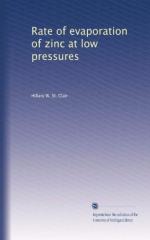|
This section contains 616 words (approx. 3 pages at 300 words per page) |

|
Evaporation is the change from a liquid state to a vapor phase. This change, unlike boiling, can occur at any temperature. Evaporation occurs when a liquid is left with its surface exposed to the air. A commonly encountered example is when puddles of water, left on the grounds after rain, eventually disappear due to evaporation.
A number of factors control the rate of evaporation of a liquid. Surface area is one, where the greater the surface area, the faster evaporation takes place. The temperature is also important; the higher the temperature, the more rapidly evaporation proceeds.
Evaporation can be used to separate a dissolved solid from its solvent. A good example of this is in the separation of salt from seawater. If a bowl of seawater is left standing then eventually the water will evaporate leaving behind a white residue of salt. If this is carried out slowly...
|
This section contains 616 words (approx. 3 pages at 300 words per page) |

|


